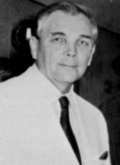Campaign
In the early days of the campaign, the conventional wisdom of political analysts was that the race would be a three-way contest between Morrison, Kennon, and Gillis Long.
As the campaign progressed, however, John McKeithen's standing in the polls rose rapidly. McKeithen, who had been a floor leader for the Longite faction in 1948, was endorsed by Earl Long's widow, Blanche Revere Long, who served as his campaign manager. He would later appoint her to a key department in his administration.
Gillis Long was endorsed by Senator Russell B. Long and was vying with McKeithen for the support of the Longite faction.
Kennon had the support of some business and industrial interests, as well as some segregationist voters.
Some observers theorized that the assassination of President John F. Kennedy, which occurred just days before the primary election, may have had a significant impact on the results. The assassination weakened Kennon's prospects because Kennon had in a televised address been highly critical of certain policies of both President Kennedy and Attorney General Robert F. Kennedy describing the Kennedy brothers as "young, misguided men." McKeithen had also criticized the Kennedys, describing both Gillis Long and Chep Morrison as "the Washington candidates." While it did not play as prominent role as in the 1959–60 campaign, race was an important issue in the primary. Jackson was the vocal segregationist among the five candidates, and Kennon discussed "state sovereignty", which some saw as a code word for segregation.
Results
Just as in his previous two gubernatorial elections, Morrison found the bulk of his support in New Orleans and South Louisiana. McKeithen's strong support in North Louisiana earned him a place in the runoff. Gillis Long did well in South Louisiana, but the presence of so many strong North Louisiana candidates denied him a significant base of support in that region.
The fifth-place candidate, Shelby Jackson, ran as a vocal segregationist. He drew conservative and segregationist votes from Kennon and therefore worked to deny Kennon the second spot in the runoff against Morrison. Even if half of Jackson's votes had otherwise gone to Kennon, then Kennon, and not McKeithen, would have faced the runoff with Morrison. Jackson's supporters were also believed in many cases to have been previous backers of the 1959 segregationist gubernatorial hopeful, William M. Rainach of Claiborne Parish.
Run-off
Campaign
In the runoff, McKeithen echoed the racist tactics of former governor Jimmie Davis in the 1960 campaign, charging that Morrison was supported by an NAACP bloc vote. Portraying himself as a Southerner threatened by outside interests, asking the people of the state "Won't you help me?" He likewise borrowed Earl Long's criticisms of Morrison as a toupee-wearing city slicker out of touch with rural voters.
Results
McKeithen won 44 of 64 parishes, including every North Louisiana parish. Avoyelles was the most northerly parish to support Morrison. McKeithen's geographic support was strikingly similar to Jimmie Davis' in the 1960 runoff; he won every Davis parish except one.
In the race for lieutenant governor, C. C. Aycock, the incumbent, ran successfully as an "Independent" Democrat, meaning that he was allied with no gubernatorial candidate.



